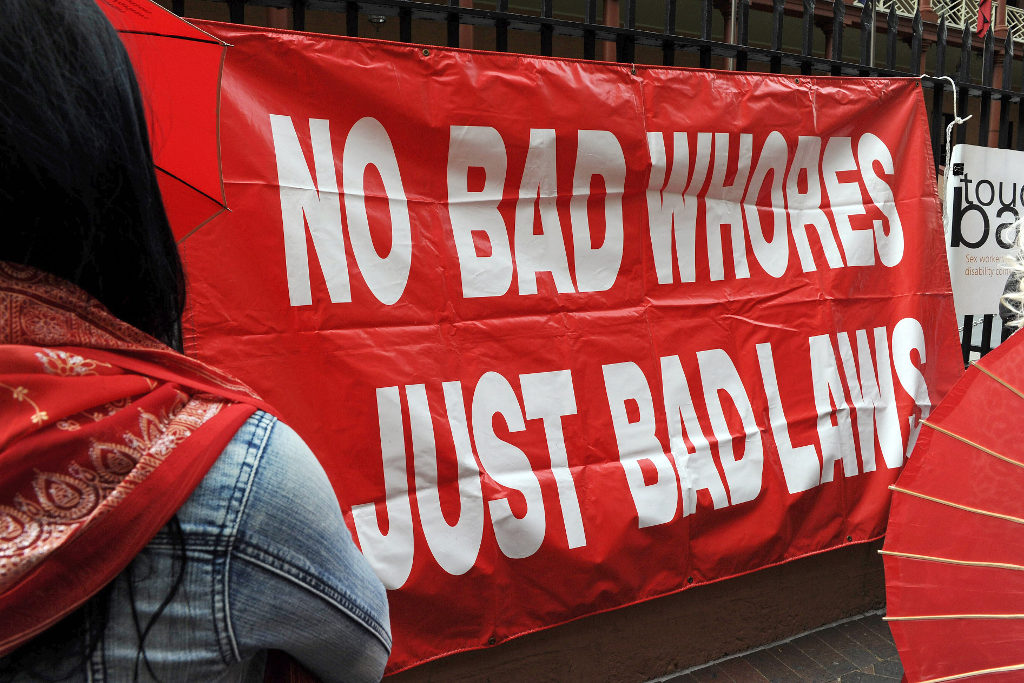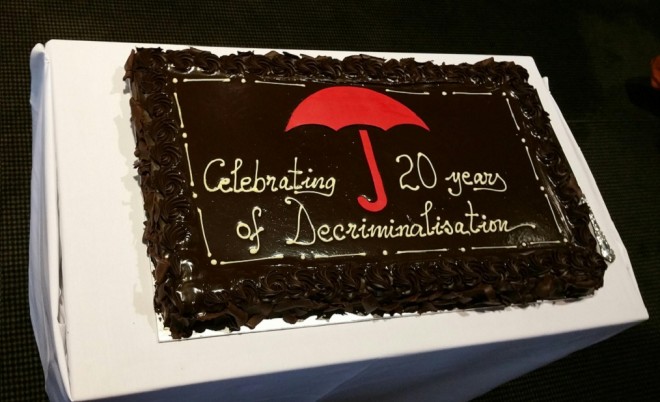“Politicians Still Get To Drag Us Through The Mud”: The Fight For Safe, Legal Sex Work Isn’t Over Yet
Sex worker Christian Vega was at an event commemorating the victory this week. It would've been better had it not followed an inquiry report recommending police crack down on brothels.

At the start of the month we held our first youth unconference, JUNKET. Over the coming weeks we’ll be sharing thoughts and features from some of our 200 delegates on the topics they raised. This, from Christian Vega, leads on from a session he ran about the decriminalisation of sex work.
–
As some people wore red poppies in remembrance of the end of the First World War on Wednesday, others also raised red umbrellas to remember a different battle: the fight against corruption and discrimination that resulted in the decriminalisation of sex work.
The red umbrella is the international symbol of sex worker human rights, and these rights were the basis for decriminalising sex work in New South Wales 20 years ago. To commemorate this moment, advocacy group Touching Base (an organisation made up of sex workers and people living with disability), Scarlet Alliance (the Australian Sex Workers Association), and SWOP NSW (a local sex worker health agency) held a gathering at Parliament House. As a sex worker sitting in attendance, I was struck by how proactive the speakers were and how completely engaged politicians were with the issues that directly impact the lives of people in my community. But it wasn’t all celebration. Just a few days prior, that red umbrella had been threatened with another blow.
Since August, NSW Parliament has been conducting an inquiry into the regulation of brothels, assessing the local and state government’s role in their operation. Last weekend it was thrown into disarray when SMH journalist Eamonn Duff leaked the recommendations of its report (later published on Tuesday). In what seems to be a retrograde step and contrary to much of the evidence tabled before it, the inquiry’s report recommends police be granted “greater powers” to enter premises and monitor activity therein — a power they were stripped of in the mid-‘90s due to corruption.
Alex Greenwich, Independent member for Sydney and one of the seven committee members of the inquiry, immediately gave the report a solid thumbs down because of this. “I want sex workers to know that they have allies from across the parties,” he said. Speaking at the Touching Base event, he highlighted the empathy other communities could have with sex workers. “As a gay man I feel that affinity … Every day we deal with a government that tries to regulate our everyday lives.”
We don't want a system where Police are both the protectors and prosecutors of sex workers – with @AlexGreenwich pic.twitter.com/HqzqLXpi2L
— Jo Haylen MP (@johaylen) November 10, 2015
Along similar lines, former Liberal Senator and previous President of the NSW Anti-Discrimination Board, Chris Puplick, spoke about two major issues during his time — the extensive police corruption uncovered by the Wood Royal Commission and the advent of HIV in Australia — and how the decriminalisation of sex work was an effective response to both of these crises.
“Let the evidence guide us,” he said, speaking in response to the reforms currently being considered by the NSW government. “The evidence clearly tells us that decriminalisation works and the licensing regime of Victoria and the Nordic Model [of criminalising clients] do not.” He then directly criticised the previous police practices in NSW: “[Creating a] new special police squad was an invitation for corruption to take place”.
Greens MLC Mehreen Faruqi reinforced this message adding, “decriminalisation was a way to break the stranglehold organised crime had on sex work”. “Sex work is work — and it just needs to be regulated like any other job,” she said. “Decriminalisation is internationally recognised as the best practice.” The ALP’s Penny Sharpe offered similarly passionate support for this, particularly in the context of Australia’s HIV response which she described as “an absolute triumph”. “Yes, many have died but many more would have had it not been for policies including the decriminalisation of sex work.”
“20 years of decriminalisation is something worth celebrating, it is something we should be boasting about,” she added.
This backlash wasn’t just coming from the politicians either; social policy academic Eva Cox threw some major shade during her speech too. “If that report was submitted by one of my students, I would have failed it; it does not make a distinction between data and hearsay,” she said. Speaking as someone who’s launched a UTS study regarding the impact on the community from the current sex work regulatory regime, she explicitly protested the move. “Based on all of the data, the complaints made to council, when it comes to brothels, there is no problem.”
Cam Cox (CEO of the Sex Worker Outreach Project who has over 30 years’ experience as a sex worker) took a personal approach, speaking about the impact police corruption has had on his work. “On days like today my ribs hurt,” he said. Before decriminalisation, police were known to use violence to move sex workers on from where they weren’t wanted.
Through all this support from across the political spectrum, it seems extraordinary that the inquiry process and its report would make such regressive departure from what seems to be working. After the event, one of the sex workers who had made a submission to the inquiry, Delaney Bliss, spoke to me about what she felt was driving it all.
“Decriminalisation clearly has bipartisan support,” she said. “It seems that Alaistair Haskins [the chair of the Inquiry and author of its report] and Nick Kaldas [deputy police commissioner] are trying to be divisive in their mission to progress their own political careers, but in the meantime they’re screwing over the lives of sex workers.”
For me, this is a good summary of the experience. While we try to win mere crumbs of social acceptance and respect, some politicians get to drag us through the mud in an effort to win votes with no fear of consequence. Vulnerable people are being treated like political footballs.
While the event may have been a moment of pause during the hullabaloo of the NSW parliamentary inquiry, sex workers are still facing serious uncertainty with regards to future reform arising from the inquiry’s report. Now, we and our allies are reflecting on the mountain of supporting evidence and achievements we’ve made, and sharing some cake with the knowledge it could still taste a little sweeter.
–
Christian is a community active queer and sex worker of colour who’s all about the noms. Follow him on Twitter at @christianbvega
–
Feature image from a Scarlett Alliance rally outside NSW parliament in September 2012, by Greg Wood for Getty.
